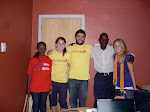This blog entry is coming on the heels of a wonderfully relaxing long weekend in Lilongwe. Pretty much everyone in Malawi had the day off on Monday to celebrate the end of Ramadan – so I was able to relax a little bit after a fantastic Teen Club session on Saturday. It was only the second Teen Club I’ve ever attended but I already felt a lot more comfortable during the event. I actually felt like I was helping the kids this time, which is a huge turnaround from the last time when everything going on was a little dizzying. For all of you guys who don’t remember what Teen Club is, its basically a once a month event where Baylor Hospital in Malawi hosts about 100 HIV+ kids. The purpose of the event is to check up on each one of these kids on a regular basis to ensure that they are adhering to their ARV medication and that everything else is going well. But ultimately Teen Club is also an opportunity for HIV+ kids to meet other HIV+ kids and make new friends.
· A goal scored by a girl counts as double.
· Everyone on the pitch has to score after every goal, even if it means cheering for your opponent.
· Each team has to come up with a special team name and cheer. The team should perform this cheer before the game, after the game and after every goal.
· Players on the field are responsible for calling their own fouls.
Each one of the rules is designed to encourage the kids to be responsible, communicative, honest, and fair. The rules are also designed to involve girls as much as possible. GRS is actively trying to increase female participation in soccer and other sports. One of the most striking statistics that I’ve heard since I’ve been here is this one: FIFA estimates that less than 1% of the world’s 260 million soccer players are female. And all the Research has shown that female participation in sport improves school performance, reduces rates of unwanted pregnancies & STI and delays sexual debut. So involving girls in soccer and other sports is just one more way to help in the fight against HIV/AIDS.
All in all the day was a huge success. The main reason we decided to pilot “Street Skillz” in Teen Club is because we were having a hard time finding an engaging activity for the older kids in the program. In the past, Teen Club in Malawi has had a lot of problems with problematic/disinterested 17 year olds who end up distracting the younger kids. So we thought that by using “Street Skillz” we would simultaneously engage the older kids and also create a less distracting environment for the younger kids who come. The idea ended up working out really well because the older kids felt special and privileged when they were allowed to play soccer, these feelings made them more willing to engage in the activities and have fun. During the planning process, a lot of people were worried that playing soccer with a group of HIV+ kids would be too risky and dangerous considering the health of each child. I don’t need to tell you how fragile each kid on ARVs is, and obviously one bad fall etc. would be potentially disastrous to them. Fortunately no one got injured and everyone came out of the day happy and healthy.
All of the pictures are amazing because in each one you can see how incredibly happy the kids are to be outside playing soccer. You can tell in each kid’s face that they feel normal and that they love the feeling. It’s really touching to think about because when you see these kids you know that they probably don’t have the chance to feel/act like normal kids very often. For a wide variety of reasons like stigma and discrimination most of these kids never have the opportunity to go outside and play soccer with the other kids in their village. So it felt really good providing these kids with the right environment to play and have fun. Hopefully I’ll get the pictures up soon, that way you can see first hand how happy the kids look. They’re all hugging after every goal, high fiving each other, dancing and smiling after every goal – it was truly an awesome thing to see. The more I think about it, the more I realize how important Teen Club is to these kids. Obviously Teen Club is important to them because it is where they get there month’s supplies of ARVs and where they get seen by doctors. But beyond that it is also important because it provides kids with a real chance to feel normal and be with kids who are similar to them. After I saw these kids leaving the soccer pitch on Saturday afternoon, I couldn’t help shaking the feeling that as soon as they left the field they were going to be thrown into this world where they were back to being “different” and “social outcasts”. As depressing as this feeling was, it also encouraged me to work extra and do my part to ensure that each session is as fun and fulfilling as possible. If these kids only get one chance and month to be normal, we better make sure that each session is as awesome as possible.

